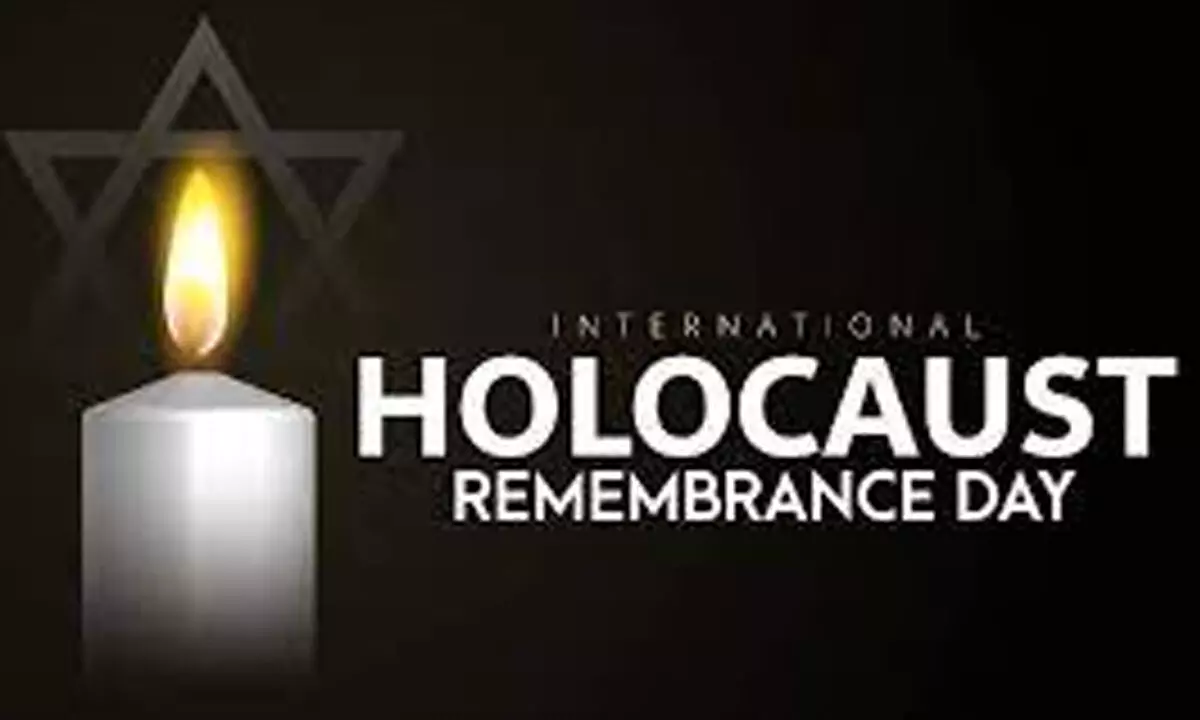Live
- 8 of 10 Indian stockbrokers to increase IT budgets for emerging tech adoption
- Utpanna Ekadashi 2024: Date, Rituals, and Significance
- New Criminal Laws: An Era of Transformation of the Criminal Justice System
- India among top 10 countries with AI readiness: Report
- UNICEF to support Kerala's children with special needs
- Meta purges over 2 million accounts linked to scam centres
- Mumbai, Delhi ranked among top 5 prime residential markets in Asia-Pacific
- Russia provided North Korea with anti-air missiles in exchange for troop deployment
- PCB appoints Azhar Ali as head of youth development
- Deepam-2 Scheme Reaches 5 Million Beneficiaries in Three Weeks, says Nadendla Manohar
Just In
What is the International Holocaust Remembrance Day Here’s all you need to know


On January 27th each year, the world comes together to honour the victims of the Holocaust, a dark chapter in human history marked by immense tragedy and loss. Since 1996, Germany has solemnly observed this day, while Israel has its own designated Remembrance Day, known as Yom HaShoah, typically observed in April.
On January 27th each year, the world comes together to honour the victims of the Holocaust, a dark chapter in human history marked by immense tragedy and loss. Since 1996, Germany has solemnly observed this day, while Israel has its own designated Remembrance Day, known as Yom HaShoah, typically observed in April. In November 2005, the United Nations General Assembly unanimously declared January 27th as the "International Day of Commemoration in memory of the victims of the Holocaust," as outlined in Resolution 60/7.
Significance of January 27th:
January 27th holds particular significance as it marks the liberation of the Auschwitz-Birkenau concentration and extermination camp by the Soviet Union's Red Army in 1945. This pivotal moment not only symbolized the end of the atrocities committed within the camp but also shed light on the horrifying extent of the Holocaust's devastation.
Reflecting on the Holocaust:
The Holocaust, orchestrated by Nazi Germany, resulted in the systematic persecution and murder of millions of individuals, including approximately six million Jews and countless others deemed undesirable by the regime. Among the targeted groups were Sinti and Roma, disabled individuals, political dissidents, homosexuals, and more. Resolution 60/7 reaffirms the critical importance of remembering the Holocaust as a stark reminder of the perils of hatred, bigotry, racism, and prejudice.
Global Efforts Against Denial and For Education:
The UN resolution unequivocally condemns Holocaust denial and underscores the necessity of educational initiatives and remembrance programs to prevent future genocides. In Israel, Yom HaShoah is marked by solemn ceremonies, including a nationwide moment of silence and a poignant memorial march from Auschwitz to Auschwitz-Birkenau.
German Remembrance:
As the nation responsible for perpetrating the Holocaust, Germany observes January 27th as a day of solemn remembrance. Since 1996, the Bundestag, Germany's federal parliament, has convened annual memorial sessions where Holocaust survivors, descendants, and leaders from across the globe share their experiences and advocate for continued vigilance against future atrocities.
Inter-generational Remembrance:
The upcoming 2024 Bundestag ceremony will focus on inter-generational remembrance, featuring speakers such as Eva Szepesi, a Holocaust survivor, and Marcel Reif, representing the younger generation. These commemorations serve as poignant reminders of the lives lost during the Holocaust and underscore the collective commitment to ensuring that such atrocities are never forgotten or repeated.

© 2024 Hyderabad Media House Limited/The Hans India. All rights reserved. Powered by hocalwire.com






